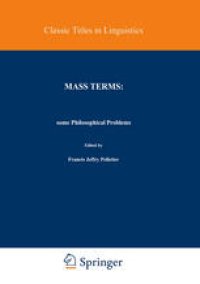
Ebook: Mass Terms: Some Philosophical Problems
- Tags: Syntax, Philosophy of Language
- Series: Synthese Language Library 6
- Year: 1979
- Publisher: Springer Netherlands
- Edition: 1
- Language: English
- pdf
I. MASS TERMS, COUNT TERMS, AND SORTAL TERMS Central examples of mass terms are easy to come by. 'Water', 'smoke', 'gold', etc. , differ in their syntactic, semantic, and pragmatic properties from count terms such as 'man', 'star', 'wastebasket', etc. Syntactically, it seems, mass terms do, but singular count terms do not, admit the quantifier phrases 'much', 'an amount of', 'a little', etc. The typical indefinite article for them is 'some' (unstressed)!, and this article cannot be used with singular count terms. Count terms, but not mass terms, use the quantifiers 'each', 'every', 'some', 'few', 'many'; and they use 'a(n)' as the indefinite article. They can, unlike the mass terms, take numerals as prefixes. Mass terms seem not to have a plural. Semantically, philo sophers have characterized count terms as denoting (classes of?) indi vidual objects, whereas what mass terms denote are cumulative and dissective. (That is, a mass term is supposed to be true of any sum of things (stuff) it is true of, and true of any part of anything of which it is true). Pragmatically, it seems that speakers use count terms when they wish to refer to individual objects, or when they wish to reidentify a particular already introduced into discoursc. Given a "space appropriate" to a count term C, it makes sense to ask how many C's there are in that space.
One of the facts of the world is that things are made up from, or constituted by, stuff. Things are indicated by count terms; stuffs are indicated by mass terms. It would therefore seem that in order to give an adequate characterization of the world one must show how things can be thus constituted; and (if one wants to use logical tools in describing language) one must show what are the differences between count and mass terms, and how they are related. One kind of change occurs when one and the same object is constituted by different stuffs at different times; another kind of change occurs when one and the same stuff constitutes different objects at different times. How is this to be explicated?
This anthology analyzes these changes and contains articles representing all the major viewpoints on such issues as: What is the mass/count distinction? Is it philosophically important? What is the designatum of a mass term? What is the logical form of sentences containing mass terms? What is it to be ‘constituted by’ a stuff? How is change to be analyzed? And so on.